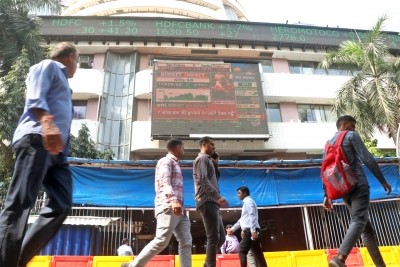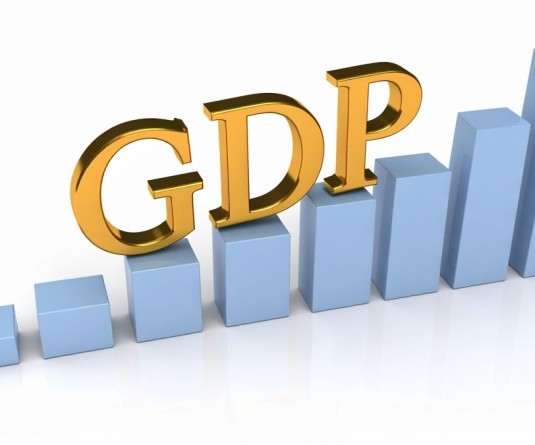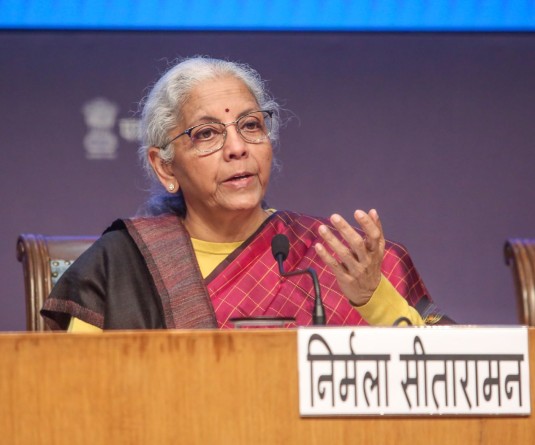
NEW DELHI, SEPTEMBER 8 (IANS): The Centre has reached out to the states again clarifying that it would pay entire GST compensation dues to them amid the mounting opposition over the borrowing options proposed in lieu of the shortfall in indirect tax collections.
Sources in the Finance Ministry said that the entire shortfall of compensation to the states -- irrespective of whether it is on account of the GST implementation or Covid pandemic -- will be compensated and the same has been communicated to the states again.
"It has never been the stand of Union Finance Minister that the loss of revenue due to Covid would not be compensated. The Central government has, time and again, committed that the entitlement of the states would always be for full compensation. The entire compensation sum on account of shortfall in collections of Goods and Services Tax (GST) will be paid and honoured", a top government source said.
Under the two options given to the states towards settlement of the GST compensation, the first option provides option to borrow by states and under a special dispensation from the RBI for a sum of about Rs 97,000 crore this year. This is the amount of shortfall calculated by the Centre that is directly on account of the GST implementation. The option two allows states to borrow from market the entire expected GST compensation shortfall of about Rs 2,35,000 crore in FY21.
States have been asked to return with their views on the options so that the scheme could be operationalised.
Doubts arose over the option 1 with few states saying that GST compensation would be paid to states only for the shortfall arising due to the implementation of the new indirect tax regime and not the shortfall arising due Covid-19 disruptions.
Finance Ministry sources said that working out the revenue shortfall on account of GST implementation is just a mechanism to assess how much of the shortfall should be met by borrowing and how much could be deferred. Borrowing for meeting the entire shortfall when the private sector is struggling to stand back on its feet could hurt them badly.
"If states go for option 1 and borrow Rs 97,000 crore, it does not mean they will have to forego the remaining compensation. The remaining compensation will be paid to the states after the above borrowing has been fully repaid. Therefore, where is the doubt about the Centre not meeting its commitment?", asked a top Finance Ministry official.
The plan is to to extend compensation cess beyond the five year transition period that ends in June, 2022. The cess collected in the extended period would entirely go towards the settlement of the compensation dues that arose during the period of transition under the formula put on the GST Act.
There have also been a demand that the Centre take over the full responsibility of the GST compensation to the states and undertake borrowings on its own to settle dues rather than putting the responsibility on the states.
Sources said that so far as the question of borrowing by the Central government is concerned, it needs to be appreciated that under the GST law, the compensation cess is a tax owned by the states and under Article 292 of the Constitution of India, Centre can borrow on the security of its own taxes and resources which is the Consolidated Fund of India. It cannot borrow in the security of the tax which it does not own.
According to an official, the compensation cess has to be transferred to the Compensation Fund and released to States in the form of compensation. It is not really a resource of the Central Government on the strength of which it can borrow under Article 292 of the Constitution of India. Compensation Cess is actually a resource dedicated to the states, and only they can borrow on the strength of future flows from cess which will eventually get credited to the consolidated Fund of States.
Also, partially meeting the resource gap through borrowing is not only beneficial for the market, but also to the states. "It will ensure that some resources in the form of compensation keep coming even after the end of transition period which would allow future generations also to maintain healthy levels of public expenditure. States falling off a resource cliff after the transition period of five year would not a prudent fiscal strategy", said the same source.
Fin Min sources said that the Government of India has already enhanced the borrowing limit from three per cent, which goes up to five per cent of GSDP. On an average the states have borrowed so far only about 1.25 per cent of the GSDP. Only a few states have reached around above two per cent of the GSDP. Therefore, "enough headroom is available to the states to borrow as per their requirements and needs. In any case, they will get the full compensation shortfall and therefore it is win-win-win for all - states, Centre, and economy" said the top official.
Borrowing by Centre to pay compensation to the states could have a bigger impact on the market and could push up the G-Sec rate, which becomes the benchmark rates for other borrowings including borrowing by the state governments. Any borrowing by the Central Government would crowd out borrowings by private sector and would make borrowings costly for entrepreneurs. The deciding factor would, thus, be whose borrowings will have least impact on the market rates.
"It is unarguable that since rates on Central Government securities works as one of the benchmarks for market rates, any additional borrowings by Centre would have higher impact on the market rates than that by States. If the benchmark rates increases on account of borrowing by the Center, the states too will get impacted because it will increase their cost of borrowing", said the source in the know of the matter.
Therefore, the Centre is in favour of the states raising the additional resources to meet the resource gap due to non-availability of compensation. "Since the repayment will come from the compensation cess, there is no reason why the rates would be different from each State. In fact, the debt window could be so packaged that it is state independent altogether", said the top sources.






